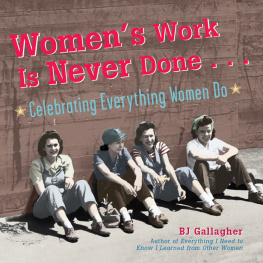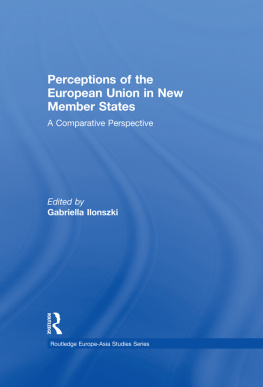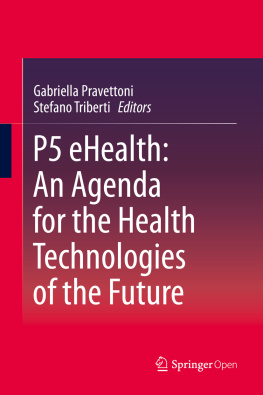WOMENS WORK AND LIVES IN RURAL GREECE
To my mum Alexandra, to my Freddie and to my wonderful friends in Leicester
Womens Work and Lives in Rural Greece
Apprearances and Realities
GABRIELLA LAZARIDIS
University of Leicester, UK
First published 2009 by Ashgate Publishing
Published 2016 by Routledge
2 Park Square, Milton Park, Abingdon, Oxon OX14 4RN
711 Third Avenue, New York, NY 10017, USA
Routledge is an imprint of the Taylor & Francis Group, an informa business
Copyright 2009 Gabriella Lazaridis
Gabriella Lazaridis has asserted her right under the Copyright, Designs and Patents Act, 1988, to be identified as the author of this work.
All rights reserved. No part of this book may be reprinted or reproduced or utilised in any form or by any electronic, mechanical, or other means, now known or hereafter invented, including photocopying and recording, or in any information storage or retrieval system, without permission in writing from the publishers.
Notice:
Product or corporate names may be trademarks or registered trademarks, and are used only for identification and explanation without intent to infringe.
British Library Cataloguing in Publication Data
Lazaridis, Gabriella
Womens work and lives in rural Greece : appearances and
realities
1. Rural women - Greece - Social conditions 2. Rural women
- Greece - Economic conditions 3. Sex role in the work
environment - Greece 4. Greece - Rural conditions
I. Title
305.4209495091734
Library of Congress Cataloging-in-Publication Data
Lazaridis, Gabriella.
Womens work and lives in rural Greece : appearances and realities / by Gabriella
Lazaridis.
p. cm.
Includes bibliographical references and index.
1. Rural women--Employment--Greece--Crete--History--20th century. 2. Women in agriculture--Greece--Crete--History--20th century. 3. Women--Greece--Crete--Social conditions--20th century. I. Title.
HD6181.83.Z6C744 2009
331.409495091734--dc22
2008040169
ISBN 9780754612124 (hbk)
Contents
This book has been long in the making and the debts I have accumulated are many. I received hospitality, friendship and intellectual support from Jackie West in Bristol, to whom I remain deeply grateful.
To the people of Nohia and Platanos, let me express my profound gratitude for their hospitality and for having given of their precious time to answer my questions and share with me their way of life. Without their cooperation and understanding, this study would have been impossible.
I am indebted to Katerina Grenda-Christodoulaki for introducing me to the villagers and hence facilitating their acceptance of me. The invaluable help of the various officials working in the Orthodox Academy of Crete in Kolymbari, in the local government offices and cooperatives in Nohia and Platanos and in the offices of the Agricultural Bank of Greece and the Local Departments of the Ministry of Agriculture situated in Kastelli, Kolymbari and Chania, in giving me access to records and information is greatly appreciated.
The preparation of the final manuscript for publication has been assisted by Jo Morgan. Thank you, Jo. Many thanks to Nick James for preparing the index efficiently.
Many thanks to Taylor and Francis for letting me reproduce the paper Sexuality and its Cultural Construction in Rural Greece, published in the Journal of Gender Studies, 1995, Vol. 4, No. 3, http://informaworld.com.
I would also like to thank the Malta University Publishers Ltd for letting me reproduce parts of the papers Market Gardening and Womens Work in Greece and Aspects of Greek and Cretan Rural Development; both appeared in the Journal of Mediterranean Studies, 1995, Vol. 2, and Vol. 5 respectively.
My debt to Nick James, Tristram Hooley and Veronica Moore, whose unceasing encouragement sustained me during the difficult times, is enormous.
Over the last five difficult, rainy years, my beloved Freddie and my loving friends in Leicester have always been there for me, supported me and encouraged me to keep going on. It is to them and to my mother Alexandra that I dedicate this book.
| Agrotis (m.), agrotissa (f.), agrotes (plural) | used as a generic term in the Greek literature referring both to those who, with the help of their families, work the land, own their means of production and land and can dispose of it and its products, and to those who engage in agricultural wage-labour |
| ATE | Agricultural Bank of Greece |
| Cafeneion | Coffee shop |
| CAP | Common Agricultural Policy |
| EEC | European Economic Community |
| EU | European Union |
| EOMMEX | Hellenic Organization for Small and Medium-size Industries, Handicrafts |
| EOT | Greek Tourist Board |
| FEOGA | Fonds Europeen d Orientation et de Garantie Agricole |
| GDP | Gross domestic product |
| IMPs (in Greek, MOPs) | Integrated Mediterranean Programmes |
| KEPE | Centre for Planning and Economic Development |
| KKE | Greek Communist Party |
| Koukouli/koukoulia | Cocoon/cocoons |
| NELE | County Council Committee for Popular Education |
| Nomos | Prefecture, county |
| OAK | Orthodox Academy of Crete |
| OGA | Organization for Agricultural Insurance |
| PASOK | Panhellenic Socialist Party |
| Stremma | 0.25 acres or 0.10 hectares |
Have women in rural Greece been empowered by economic development?
This book explores the limits and the possibilities of economic change in transforming the lives of women in rural Greece at a time of great economic and political change. The books detailed analysis is of the period from 1970 to 1988, from the regime of the Colonels, to the rise of PASOK and Greek membership of the EU, with many additional references to the period thereafter. It is based on ethnographic research conducted in two communities of Western Crete: Nohia and Platanos. Lazaridis concentrates on three activities women are involved in: handcrafts in Nohia, market-gardening in Platanos, and olive-growing which is common to both villages. She further draws on a wealth of statistical and demographic data from Greek government and state archives, on contemporary government and other reports and on interviews with government agencies, agricultural scientists and womens organizations.
The result is a rich and fascinating account of the changing dynamics of rural life in a still-remote part of Europe. Gabriella Lazaridis is interested in the socio-cultural influences of economic development. How do the communities she studies differ in their views on womens identity and role? Are they able to move beyond traditional and religious ideals to address the needs of local women and how is this related to their different economic development? In addressing these questions Lazaridis offers an important contribution to social anthropology, rural sociology and to the literature on gender and development.










